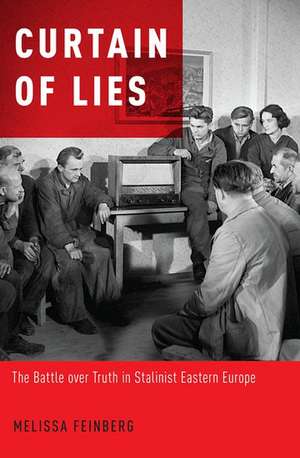Curtain of Lies: The Battle over Truth in Stalinist Eastern Europe
Autor Melissa Feinbergen Limba Engleză Paperback – 13 aug 2020
| Toate formatele și edițiile | Preț | Express |
|---|---|---|
| Paperback (1) | 215.59 lei 10-16 zile | |
| Oxford University Press – 13 aug 2020 | 215.59 lei 10-16 zile | |
| Hardback (1) | 533.32 lei 10-16 zile | |
| Oxford University Press – 15 iun 2017 | 533.32 lei 10-16 zile |
Preț: 215.59 lei
Preț vechi: 245.73 lei
-12% Nou
Puncte Express: 323
Preț estimativ în valută:
41.27€ • 44.84$ • 34.69£
41.27€ • 44.84$ • 34.69£
Carte disponibilă
Livrare economică 20-26 martie
Preluare comenzi: 021 569.72.76
Specificații
ISBN-13: 9780190087609
ISBN-10: 0190087609
Pagini: 256
Ilustrații: 7
Dimensiuni: 156 x 234 x 15 mm
Greutate: 0.4 kg
Editura: Oxford University Press
Colecția OUP USA
Locul publicării:New York, United States
ISBN-10: 0190087609
Pagini: 256
Ilustrații: 7
Dimensiuni: 156 x 234 x 15 mm
Greutate: 0.4 kg
Editura: Oxford University Press
Colecția OUP USA
Locul publicării:New York, United States
Recenzii
I find Melisa Feinberg's book innovative and original and very important for our contemporary perspective.
Melissa Feinberg's Curtain of Lies is a provocative analysis of truth and fear in Eastern Europe during the early Cold War.
Feinberg's findings and their engaging, accessible, and well-structured delivery will benefit teachers and students of US history at least as much as those who are interested in Eastern Europe and the Cold War.
Melissa Feinberg has written an important and timely book.
Melissa Feinberg's fast-paced book, Curtain of Lies, delves into the question of truth as framed by the Cold War struggle in late Stalinist Eastern Europe. Based on an intriguing analysis of hundreds of Western interviews with East Europeans who fled the east for the west, Feinberg demonstrates that ideas of truth and falsehood emerged from a nexus of propaganda, counterpropaganda, radio broadcasting, and fantastic ideas of peace and war in West and East.
Written in clear, strong prose, Curtain of Lies delivers a fresh perspective on Cold War propaganda, revealing that the cliches of show trials and peace offensives articulated deep-set ideas about truth, belief, and fear.
The originality of Feinberg's research lies in her close attention to the lived experience of the participants in the 'battles for truth' across the Iron Curtain. She attends to the manufacturing of official propaganda by agentda of the state, as well as o the dilemmas of daily life in a world of half-truths, lies, and fear
A fresh perspective on the formation of Cold War political culture in post-war eastern Europe and the United States is provided by Melissa Feinberg's fascinating analysis of a topic that has been discussed by many scholars before.
Feinberg usefully draws attention to the extent to which communist rule depended on beliefs and culture as distinct from actual violence.
Melissa Feinberg's Curtain of Lies is a provocative analysis of truth and fear in Eastern Europe during the early Cold War.
Feinberg's findings and their engaging, accessible, and well-structured delivery will benefit teachers and students of US history at least as much as those who are interested in Eastern Europe and the Cold War.
Melissa Feinberg has written an important and timely book.
Melissa Feinberg's fast-paced book, Curtain of Lies, delves into the question of truth as framed by the Cold War struggle in late Stalinist Eastern Europe. Based on an intriguing analysis of hundreds of Western interviews with East Europeans who fled the east for the west, Feinberg demonstrates that ideas of truth and falsehood emerged from a nexus of propaganda, counterpropaganda, radio broadcasting, and fantastic ideas of peace and war in West and East.
Written in clear, strong prose, Curtain of Lies delivers a fresh perspective on Cold War propaganda, revealing that the cliches of show trials and peace offensives articulated deep-set ideas about truth, belief, and fear.
The originality of Feinberg's research lies in her close attention to the lived experience of the participants in the 'battles for truth' across the Iron Curtain. She attends to the manufacturing of official propaganda by agentda of the state, as well as o the dilemmas of daily life in a world of half-truths, lies, and fear
A fresh perspective on the formation of Cold War political culture in post-war eastern Europe and the United States is provided by Melissa Feinberg's fascinating analysis of a topic that has been discussed by many scholars before.
Feinberg usefully draws attention to the extent to which communist rule depended on beliefs and culture as distinct from actual violence.
Notă biografică
Melissa Feinberg is Associate Professor of History at Rutgers University, New Brunswick. She is the author of Elusive Equality: Gender, Citizenship and the Limits of Democracy in Czechoslovakia, 1918-1950.
